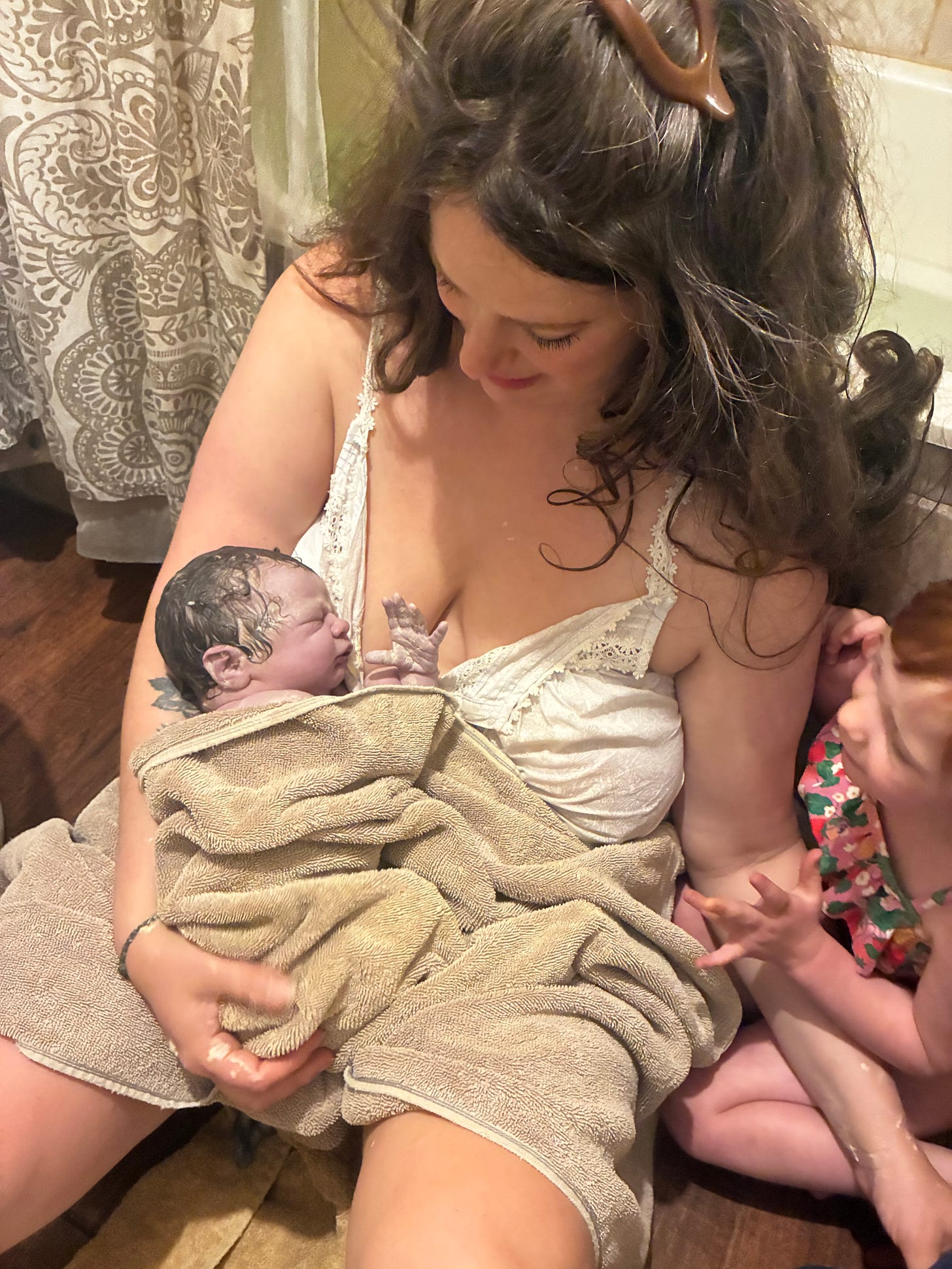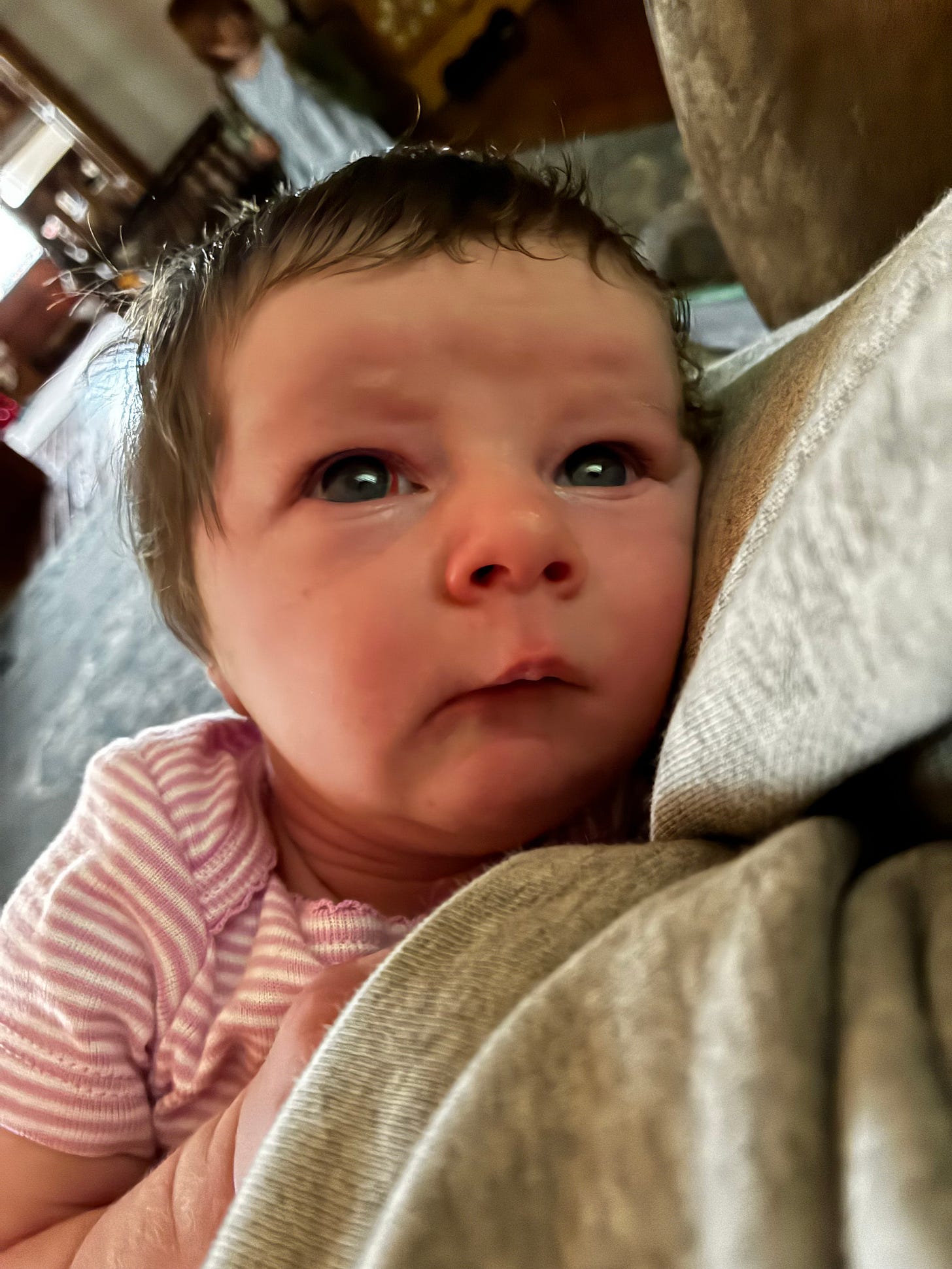I recline on my couch, holding my baby. She is new, new to me and to this place, this living room full of wooden play food and Bluey stickers and children’s books with perhaps a page or two torn. Once, this place was new to the children before her, the ones who perhaps tore those pages and be-stickered the wooden play kitchen. You forget, you know, how this newness fades over time. There is simply just the time before and the time after each child is born, as the time after gets to feeling like they have been here forever before you realize it. But there is an in-between.
The time when she is new still, where a gentle endurance makes the constant nature of care possible, where it is often sticky and salty and the warmth of milk and tears and blood fall. The time when the main purpose of my days are getting to know her, this person with velveteen hair and tiny white milia on her nose like freckles, with fuzzy shoulders and little red splotches all over, the little person who makes me think of wolf pups, whose feet paw at my newly empty belly and who sounds like a little cat when she is displeased and hungry. The time when I sit with her on the couch while she is new, and I look outside and see a Mourning Dove fly into her nest to feed her own new offspring. Hers will fly soon. My own requires more of me.
The last image in my photos from before I went into labor is the below screenshot, saved to maybe glimpse at in my time of need:
My water broke not even an hour later I saved that image.
While the endurance of the life with a newborn is a gentle endurance, the endurance of labor is much more grueling, it is a toil for me. I am no orgasmic birther, I am no Hypnobirther, I am not even a water birther. I’m a “let’s get this over with” sort of birther. This is why the quote above appealed to me in those heavy moments where surely my body knew what was coming before I did mentally.
My own personal paradise was reached somewhere around 10 AM three Fridays ago, in my lower level bathroom, just about thirteen hours after my water broke while I laid on the couch watching Kung Fu Panda with my kids and about 23 hours after I walked out of my last appointment with the CNM I had been seeing for prenatal care. Two and a half hours prior to giving birth I was coordinating with my friend and neighbor a ride for my eldest to school so she wouldn’t miss field day. Less than 24 hours later I would be celebrating my 3 year old turning 4, and waking my 13 year old to get up and get ready to get on the bus to the city to run her first 5k. In the midst of every day, ordinary life, miracles can exist and paradise is sometimes present.
A night full of “let’s get this over with”, of regaining my resolve and metaphorically getting back up again after intense contractions that were working to push my transverse baby into a more vertex baby, and finally a moment of getting myself up off the couch after some dread-filled procrastination knowing that the mere act of standing would propel my body into transition led me to the paradise that is relief. Relief that it was in fact over with, that my baby was pink and crying, that the fear and anticipation that follows the pregnant woman in her months of growing—no matter her experience or confidence—had been lifted.
The relief slowly transmutes into a core-deep and almost painful kind of beautiful, delicate disbelief and awe. It’s a feeling of being indebted to God for what has been given. Once the labor of childbirth is finished and the afterpains fade, the placenta delivered and the blood wiped off of our inner thighs—what felt hours before like a burden or curse earned becomes a very obvious precious gift. A bounty, a reaping of the body, a harvesting of the fruitful and heroic efforts of our own wombs. As the pain and suffering fades and the blood slows, what we wanted becomes something, someone, we were given.
"Mother" (1900) by Joaquín Sorolla
Labor was uneventful and progressed normally after my water broke, but the process of pushing my baby out of my body was much harder than it has been in the past for me however, even more so than my baby I pushed out flat on my back in the hospital and for whom an episiotomy was cut to make way for, and even more so than my breech baby. This baby, I suspect due to her transverse lie prior to my water breaking, was facial presenting. This is not the same as OP or “sunny side up”, as many assume. Her neck was extended so that her little nose and chin were I felt when I felt inside of myself as I was pushing, wondering why my efforts seemed to not be as effective as they have been in the past. I pushed my last two children out in two or three pushes. This was not going like that.
She did come out with some valiant effort on my part if I do say so. The primitive fetal ejection reflex of my body had to be paired with some conscious assistance from my thinking brain this time, a brain that yes, was speaking in medical speak as nurse-me took over in those last few moments of birth, when I realized I could also feel her cord on top of her face. I knew that my body and my mind had to work with time in a very specific and precise way. And so I did, as one does in these situations. There is nothing to do but do-trudge forward like a soldier to battle, breathe deeper than you’ve ever taken in breath, and bring forth the life you have been given with all the power you possess.
She came out, me kneeling holding onto the edge of the tub, my husband catching her behind me. I heard her cry out while still behind my back and that paradise of relief poured down over me. I held her, learning that she was a “her” with a head full of dark wavy hair and not a “he” with red wavy hair like I had suspected. My 3 and 5 year olds came into the room while my husband fetched warm towels from the dryer. I quickly got very annoyed with sitting on the cold, hard tile floor and got settled on the couch. The contractions to pass the placenta began. They were just as strong as those from transition this time, and I bristled at all of the chatter around me, at one point uncharacteristically saying sharply, “just stop talking to me!”to no one in particular.
I eventually passed the placenta and my irritation dissipated. The “delivery” part of labor and delivery was complete. I have heard some griping online about the term “delivery” in reference to this particular use of it, with women saying things like “babies aren’t pizzas”, but I think they are misunderstanding the term. The word “deliverance” originated in 1300, meaning the"action of setting free" in physical or spiritual senses, from Old French delivrance.
The deliverance in birth is two-fold, the baby and her placenta are freed of the mother, and the mother freed of them. The transference of motherly responsibility from the maternal body to the maternal mind, heart and hands is what is yielded here. It is a liberation of physicality and nothing more, but this is where the relief arises from. We are freed of one another’s bodies but more fully bound to one another metaphorically, as with the act of birth come the binds of motherly stewardship and mother-child love.
In not so many words, where blood is spilt, devotion grows abundant.
Agony gives way, perfection reveals itself, the greatest gift is received. The bodies are freed but not in the sense that they are completely separate. They are freed in the sense that they are free to fully embrace one another as individual persons, curled up in a familiar but different way. Her head rests at my heart now, not at the entrance to my womb.
To elaborate on the idea of perfection, in Hannah’s Children1 by
, she states the following in reference to question that is the premise of her book-“why so many children?”:I suppose it boils down to some sort of deeply held thing, possibly from childhood—a platinum conviction —that the capacity to conceive children, to receive them into my arms, to take them home, to dwell with them in love, to sacrifice for them as they grow, and to delight in them as the Lord delights in us, that that thing, call it motherhood, call it childbearing, that that thing is the most worthwhile thing in the world-the most perfect thing I am capable of doing.
Loving and sacrificing for the the children I have born has changed the course of my life, as for each one of them, I am brought further away from the parts of myself which are reckless, self destructive and easily tempted. It is in seeing myself as a mother that I am most able to see myself as capable of good, maybe even occasionally capable of “perfect”. Not perfect in the sense of “the perfect mother” because of course this doesn’t exist, perfect in the sense that I can make these babies and understand them as fully human beings I am meant to love, listen to, and cherish in our inner sphere of familial society and eventually deliver once again, out into the outer sphere of the community and larger society.
I have been delivered of another daughter, and it is in this deliverance another layer of sacred protection from the rotten aspects of that larger society is formed, for the love for a child is an armor and the birth of a baby is a battle won.
Darla Evangeline, born at 0950 on May 9th
Yes, I quoted this book in my last essay and I am doing it again, it has been a wonderful read in my postpartum time! I have seen it discussed frequently here recently and for good reason.








That is a lot of hair. 💕 This piece made me stop breathing a few times reading it. It expressed things I couldn’t find the words to express.
Congratulations and thank you for writing! I love birth and think it’s so cool, but I’m also a “let’s get this over with” type of laborer. Right now I’m 25 weeks with my fourth and dealing with kidney pain (I tend to get stones when pregnant) and so so SO looking forward to deliverance. This piece helped me see that in a more positive light, rather than simply “I want this discomfort to end.”